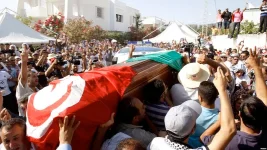Eight defendants received death sentences from a Tunisian court on Tuesday for their involvement in the 2013 killing of opposition leader Mohamed Brahmi, according to reports from local media sources.
The court found the defendants guilty of attempting to alter the nature of the state and encouraging armed conflict. Three defendants faced additional death penalties for deliberately participating in premeditated murder. A ninth person, currently evading authorities, received a five-year prison term for failing to report terrorist crimes.
Despite issuing death sentences, especially for terrorism cases, Tunisia has maintained an unofficial pause on executions since 1991, effectively converting these sentences to life imprisonment. This marks the first set of decisions regarding Brahmi's murder, which happened outside his residence on July 25, 2013, during a volatile period after Tunisia's revolution.
Following the assassination, protesters filled streets across Tunisia, with Brahmi's distinctive face becoming a symbol against militant violence. As a nationalist left-wing leader of the People's Movement and member of the Constituent Assembly, Brahmi openly criticized the Islamist-influenced government led by Ennahdha at that time.
The murder further stunned the nation because it occurred less than six months after another prominent leftist figure, Chokri Belaid, was shot outside his home. Brahmi represented Sidi Bouzid, where the 2011 revolution began that removed former president Zine El Abidine Ben Ali and sparked changes throughout the Arab world.
Assailants shot Brahmi 14 times as his wife and children watched. His family consistently accused Ennahdha of orchestrating the murder, but the party denied any involvement. The party also rejected accusations of leniency by designating the formerly legal Salafist group Ansar al-Charia as a terrorist organization.
Fighters connected to the Islamic State claimed responsibility for both assassinations. The period after the 2011 revolution saw increased Islamist extremism, with thousands of Tunisians joining conflicts in Syria, Iraq, and neighboring Libya.
Tunisia faced heightened security challenges from armed groups operating from the Chaambi Mountains near Algeria, who primarily targeted security forces and military personnel.
Attacks in Sousse and Tunis in 2015 killed numerous tourists and police officers, though authorities have reported substantial progress against extremist groups since then. The country continues under emergency status despite claims of improved security conditions.
President Kais Saied, who frames the murders of Brahmi and Belaid as national issues and refers to them as martyrs, removed dozens of judges in 2022, claiming they blocked investigations into these cases.
These high-profile killings and resulting protests eventually forced Ennahdha to surrender power to a technocratic government after a new constitution was adopted. The crisis nearly derailed Tunisia's democratic transition process. However, political discussions led by four civil society groups, including the Tunisian General Labour Union, helped restore stability and contributed to Tunisia receiving the Nobel Peace Prize in 2015.
The court found the defendants guilty of attempting to alter the nature of the state and encouraging armed conflict. Three defendants faced additional death penalties for deliberately participating in premeditated murder. A ninth person, currently evading authorities, received a five-year prison term for failing to report terrorist crimes.
Despite issuing death sentences, especially for terrorism cases, Tunisia has maintained an unofficial pause on executions since 1991, effectively converting these sentences to life imprisonment. This marks the first set of decisions regarding Brahmi's murder, which happened outside his residence on July 25, 2013, during a volatile period after Tunisia's revolution.
Following the assassination, protesters filled streets across Tunisia, with Brahmi's distinctive face becoming a symbol against militant violence. As a nationalist left-wing leader of the People's Movement and member of the Constituent Assembly, Brahmi openly criticized the Islamist-influenced government led by Ennahdha at that time.
The murder further stunned the nation because it occurred less than six months after another prominent leftist figure, Chokri Belaid, was shot outside his home. Brahmi represented Sidi Bouzid, where the 2011 revolution began that removed former president Zine El Abidine Ben Ali and sparked changes throughout the Arab world.
Assailants shot Brahmi 14 times as his wife and children watched. His family consistently accused Ennahdha of orchestrating the murder, but the party denied any involvement. The party also rejected accusations of leniency by designating the formerly legal Salafist group Ansar al-Charia as a terrorist organization.
Fighters connected to the Islamic State claimed responsibility for both assassinations. The period after the 2011 revolution saw increased Islamist extremism, with thousands of Tunisians joining conflicts in Syria, Iraq, and neighboring Libya.
Tunisia faced heightened security challenges from armed groups operating from the Chaambi Mountains near Algeria, who primarily targeted security forces and military personnel.
Attacks in Sousse and Tunis in 2015 killed numerous tourists and police officers, though authorities have reported substantial progress against extremist groups since then. The country continues under emergency status despite claims of improved security conditions.
President Kais Saied, who frames the murders of Brahmi and Belaid as national issues and refers to them as martyrs, removed dozens of judges in 2022, claiming they blocked investigations into these cases.
These high-profile killings and resulting protests eventually forced Ennahdha to surrender power to a technocratic government after a new constitution was adopted. The crisis nearly derailed Tunisia's democratic transition process. However, political discussions led by four civil society groups, including the Tunisian General Labour Union, helped restore stability and contributed to Tunisia receiving the Nobel Peace Prize in 2015.












